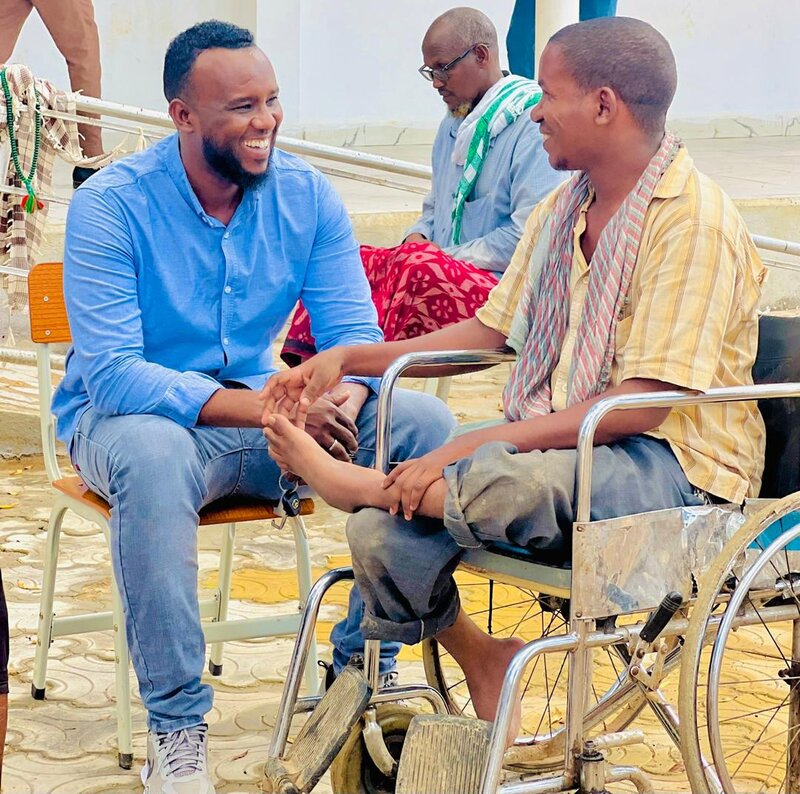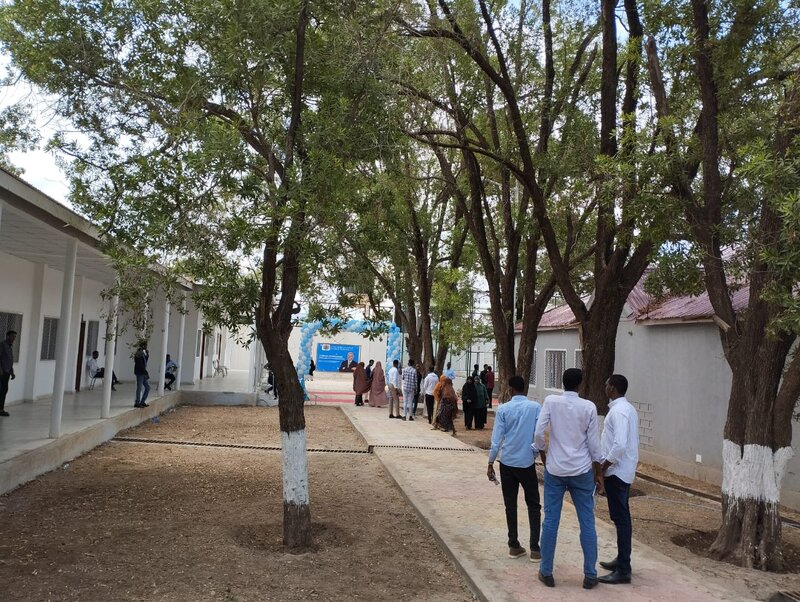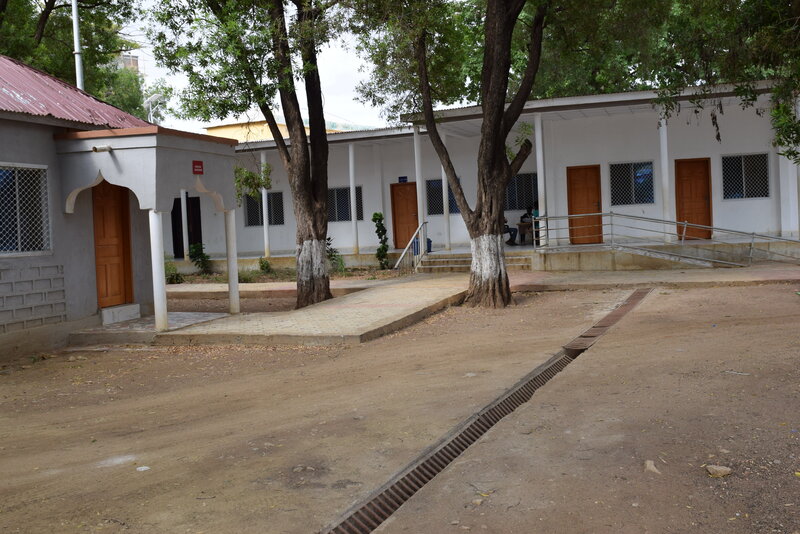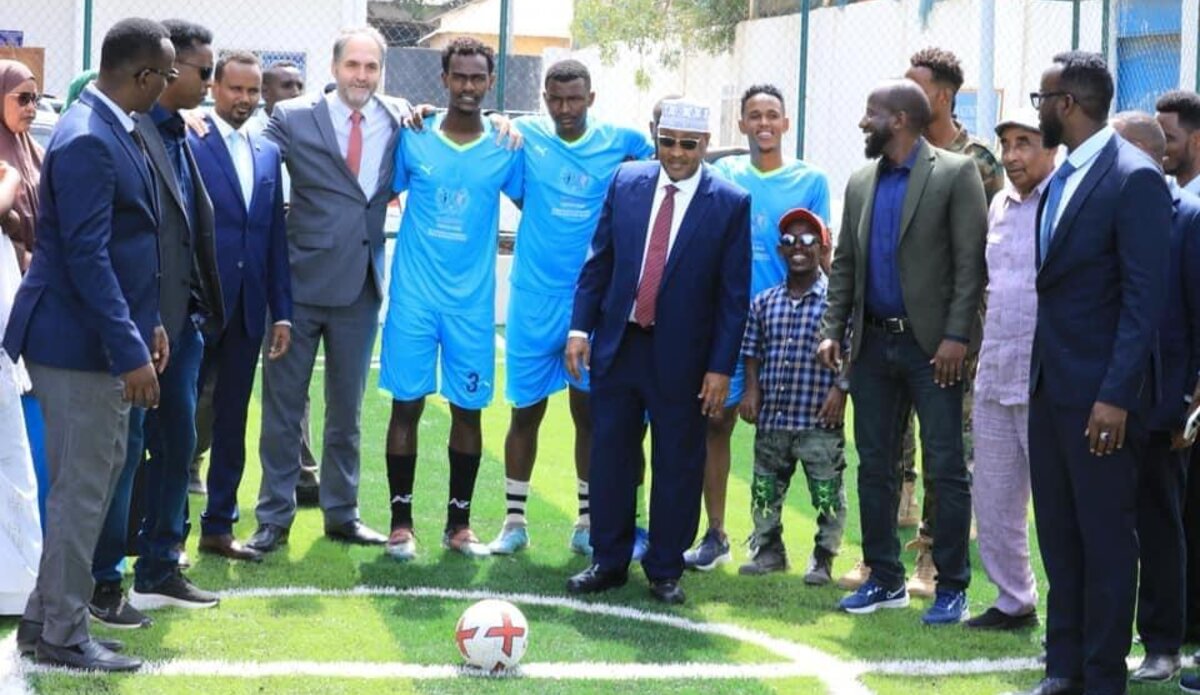Baidoa Youth Hub: From agricultural depot, militia hideaway and khat storage site to centre for young Somalis
Baidoa – The Baidoa Youth Hub is located at the end of Wakaladda Biyaha Street in the heart of Baidoa. At its main entrance, there is a constant stream of young Somalis passing through.
Their easygoing energy and smiles match the fresh paint and well-maintained trees and buildings which house the Hub’s modern facilities. These include state-of-the-art technology training rooms, a well-stocked library, a football pitch, conference room and a cafeteria.

The current state – and use – of the space is in stark contrast to the building’s chaotic past.
“This establishment has faced numerous challenges before emerging as the Baidoa Youth Hub – and they were indeed challenges,” says Abdiaziz Abdirahman Mohamed, the Director General of the Ministry of Youth and Sports (MoYS) for Somalia’s South West State, of which Baidoa is the largest city.
“It was originally built in the 1970s by Somalia’s former central government to house agricultural advisory services,” he adds. “But, with the war, it fell into the hands of armed militias in the early 1990s following the government's overthrow. It was subsequently used as a residence for clan militias and a hub for miraa (khat) distribution.”

Troubled times
At first, it was not clear if the building could ever return to more civic and legitimate uses.
“It had been seized by militias, along with business people, following the outbreak of the Somali civil war. But it was recovered in the early 2000s by organised youth groups in Baidoa,” says Mr. Mohamed.
The youth groups lobbied the occupants and other local power-brokers for it to be re-purposed for the public good.
Initially, local non-governmental organisations, such as the Kanava Youth Development Organisation (KYDO) and then WARDI Relief and Development Initiatives, managed the building as a youth centre for more than 15 years, using it as a base for their community work.
But, after the departure of the former occupants, the state of the building was precarious, best characterized as a dilapidated and pockmarked shell, wrecked on the inside and outside through years of neglect and conflict.
However, with support from the United Nations Development Programme (UNDP), the building was renovated and transformed into an earlier version of what it is now – a hub for community-based organisations in Baidoa, helping youth and vulnerable communities.

“It was unusable after we recovered it. Fortunately, UNDP renovated the old buildings and added new toilets,” Mr. Mohamed says.
In November 2015, after South West State was formally established as one of Somalia’s Federal Member States, its government set a goal to recover public properties which were under private control. One of these was the building housing the youth centre.
“We took over from local organizations in 2018 and began seeking support for constructing a new youth training centre from multiple agencies. Fortunately, UN-Habitat responded and helped us build the new Baidoa Youth Hub with start-up funding,” Mr. Mohamed says.
The Hub was built by the United Nations Human Settlements Programme (UN-Habitat) as part of the Youth and Urban Regeneration Somalia (YOURS) project aimed at enhancing local youth skills, and funded by the Government of Sweden.
It was opened in September 2023 – its transformation into its current iteration is complete bit its transformative effect on the lives of Baidoa youth is expected to continue for many years to come.
“The new and purpose-built youth centre is designed to incorporate facilities and services that will address the needs of young people in Baidoa such as safe spaces, sports, upskilling, access to employment, and advice and guidance. The youth centre will provide a wide range of bespoke services and training programmes in employability and livelihoods, democracy and peacebuilding, health and wellbeing, and sports and recreation,” the Hub states on its website.
MoYS manages the establishment and, less than a year since its opening, the Hub has already made a significant impact on the lives of hundreds of local young people.

“I came here to attend this peacebuilding training organized by the Ministry – it has just started today, and I expect to increase my knowledge on reducing risks and conflict management,” says Fadumo Adam, a young attendee at a recent three-day workshop.
“I am glad to have learnt basic computer skills at the Baidoa Youth Hub. We thank the South West State’s Ministry of Youth and Sports, as well as funding organizations, for facilitating for us these life skills programmes – we are now in a better place than yesterday,” says Husein Ali, a 21-year-old youth as he left the centre recently.
The impact extends across various areas.
“I’m part of the youth who have benefited from this newly-built hub. I have learnt entrepreneur skills,” says 20-year-old Zakariye Mohamed. “And, on top of that, I come to this beautiful football pitch every afternoon to play with my friends and colleagues. It can be easily accessed as it is located in the centre of town!”
New prospects
In a country where youth make up 70 per cent of the population, unemployment is high, and the informal sector is the main source of jobs, the Baidoa Youth Hub has been pivotal in tackling these challenges locally, both during and after its construction.
In addition to the centre’s construction, UN-Habitat funded a four-month start-up project – the Youth and Urban Regeneration Somalia project – after the hub’s construction. A local NGO, the Somali Youth Volunteers Association (SOYVA), implemented it.

“From October 2023 to February 2024, the centre trained over five hundred local students in life skills, including peacebuilding, literacy, numeracy, computer skills, entrepreneurship, and employability. We are grateful to UN-Habitat for the new hub and the skills training funding. Our thanks also go to SOYVA for their work,” says Mr. Mohamed.

However, more support is needed to extend the venue’s ability to assist local youth. Due to funding challenges at the MoYS, there are few other options.
“The majority of South West State’s youth lack access to education, employment, and training, which drives some to join armed groups involved in violence. To combat this, we need increased funding for youth programmes,” says MoYS’ Mr. Mohamed, who has taken a hands-on approach in overseeing the centre’s operations, regularly engaging with its director, teachers and students.
The government official’s call is echoed by local NGOs.
“As SOYVA, we call on international partners to aid in building the capacity of youth and women in the South West State, focusing on peacebuilding, life skills, and entrepreneurship that foster employment,” says the youth group’s programme manager, Mohamed Abdisalam.
UN support
UN-Habitat is the world body’s agency dedicated to all urbanization and human settlement matters within the UN system. It works with partners to build inclusive, safe, resilient and sustainable cities and communities on the premise that urbanization is a positive transformative force for people and communities, reducing inequality, discrimination and poverty.
The UN agency has been active in the Somalia urban sector for more than 30 years. The interventions have evolved from responding to immediate local needs to systematic attempts to address sustainable urban development through integrated human settlement programmes.

“The Baidoa Youth Hub is a key investment by UN-Habitat to tackle the diverse challenges Somali youth face. It provides education, job opportunities, and fosters social cohesion, playing a crucial role in peacebuilding, especially in South West State,” says UN-Habitat National Programme Officer Abdirahman Barkhadle.
“The Hub offers a safe and inclusive space for young people to gather, share their views, and engage in positive activities,” he adds. “This helps reduce the risk of recruitment by militant groups or involvement in violence.”
 UN
UN





